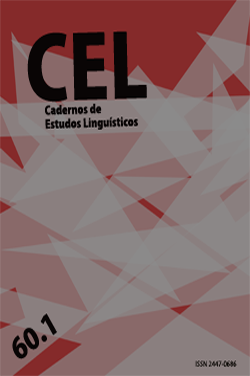Abstract
Este artigo propõe uma semântica para muito modificador de verbos. Essa proposta estende a Semântica de Delineação (KLEIN, 1980; BURNETT, 2014; 2015) para o domínio dos eventos. muito P, em suas várias manifestações (modificando verbos, adjetivos ou nomes), é uma função que denota o conjunto dos que estão na extensão positiva do predicado. A análise assume que há eventos na ontologia (PARSONS, 1990), que se estruturam em reticulados (KRIFKA, 1983; ROTHSTEIN, no prelo). A comparação com advérbios como a lot (‘muito’; inglês) e beaucoup (‘muito’; francês) mostra esses modificadores compartilham leituras (frequência, duração e quantidade de objetos ou suas partições) e restrições (i.e. não se combinam com accomplishments). Com estados, esses advérbios produzem leitura de intensidade, porque estados são de-adjetivais e adjetivos ordenam os objetos em extensões positivas, negativas ou vagas. Explicamos as leituras e as restrições assumindo que muito pressupõe mais de um (de eventos, de momentos no tempo, de objetos ou porções de objetos) e opera sobre ordenações dadas na ontologia, mas indicadas contextualmente pela classe de comparação.
References
BACH, Emmon. The algebra of events. Linguistics and Philosophy ,n. 9, vol. 1, p. 5-16, 1986.
BALE, Alan.; BARNER, David. The interpretation of functional heads: using comparatives to explore mass/count distinction. Journal of Semantics, 26, p. 217-252, 2009.
BASSO, Renato; PIRES DE OLIVEIRA, Roberta. Generic and weak demonstratives: the realm of kinds. Journal of Portuguese Linguistics, 14(1), p. 45-62, 2015.
BEVILÁQUA, Kayron; PIRES DE OLIVEIRA, Roberta. Brazilian Bare Phrases and Referentiality: Evidences from an Experiment Letras, 90, p. 253-275, 2014
BURNETT, Heather. A delineation solution to the puzzles of absolute adjectives. Linguistics & Philosophy, 37, p. 1-39, 2014
BURNETT, Heather. Comparison Across Domains in Delineation Semantics. Journal of Logic, Language and Information. 24, p. 233-265, 2015.
CHIERCHIA, Gennaro. Plurality of mass nouns and the notion of ‘semantic parameter’. In: Rothstein, S. (Org.). Events and grammar. Dordrecht: Kluwer, 1998. p. 53-103.
DAVIDSON, Donald. The logical form of action sentences. In: RESCHER, N. (org.) The logic of decision and action. Pittsburg: University of Pittsburg Press, 1967.
DOETJES, Jenny. Quantifiers and selection: on the distribution of quantifying expressions in French, Dutch and English. PhD dissertation. Leiden University, 1997.
DOETJES, Jenny. Adverbs and quantification: degree versus frequency. Lingua, 117, p. 685–720, 2007.
GUIMARÃES, M. R. Dos intensificadores como quantificadores. Tese (Doutorado em Letras). Universidade Federal do Paraná, Curitiba, 2007.
ILARI, Rodolfo et alii. Considerações sobre a ordem dos advérbios. In: CASTILHO, Ataliba Teixeira de (org.). Gramática do português falado I: a ordem. Campinas/São Paulo: Editora da UNICAMP/FAPESP, 1993. p. 65-140.
KAMP, Hans. Two theories about adjectives. In: KEENAN, E. (org.). Formal semantics of natural language. Cambridge: Cambridge University Press, 1975. p. 123-155.
KENNEDY, C. Projecting the adjective. PhD Dissertation. University of California at Santa Cruz, 1997.
KENNEDY, C. Vagueness and grammar: the semantics of relative and absolute gradable adjectives. Linguistics and Philosophy, 30(1), p. 1-45, feb. 2007.
KLEIN, Ewan. A semantics for positive and comparative adjectives. Linguistics and Philosophy 4, p. 1-45, 1980.
KLEIN, Ewan. The interpretation of adjectival, nominal and adverbial comparatives. In: Groenendijk, J.A.G.; Janssen, T.M.V.;Stokhof, M.B.J. (orgs.) Formal methods in the study of language. Amsterdam: Matematisch Centrum, 1981. P. 381-398.
KRIFKA, M. Nominal reference, temporal constitution and quantification in event semantics. In: Bartsch, R.; van Benthem, J; van Emde Boas, P. (Orgs.). Semantics and contextual expression. Dordrecht: Foris, 1989. p. 75-115.
KRIFKA, M. Four thousand ships passed through the lock: object-induced measure functions on events. Linguistics and Philosophy,n. 13, p. 487-520, 1990.
LANDMAN, Fred. Events and Plurality. Kluwer Academic Publishers, Dordrecht, 2000.
LANDAMAN, Fred; ROTHSTEIN, Susan 2012. The felicity of aspectual for-phrases Part I: Homogeneity. Language and Linguistics Compass 6/2 85–96, 2012.
MITTWOCH, Anitta. Aspects of the English aspect: on the interaction between perfect, progressive and durational phrases. Linguistics and Philosophy, vol. 11, n. 2, p. 203-254, may 1988.
MÜLLER, Ana Lúcia. Genericity and the denotation of common nouns in Brazilian Portuguese. D.E.L.T.A, n.18, p.287-308, 2002.
PARSONS, T. Events in the Semantics of English. Cambridge, MA: MIT Press, 1990.
PIRES DE OLIVEIRA, Roberta; ROTHSTEIN, Susan. Bare Singular noun phrases are mass in Brazilian Portuguese. Lingua, 121, p. 2153-2175, 2011.
PIRES DE OLIVEIRA, Roberta; SOUZA, Luisandro M. O singular nu e a comparação: uma proposta de derivação semântica. LinguíStica, vol. 9, n. 1, p. 31-54, jun. de 2013.
PIRES DE OLIVEIRA, Roberta; BASSO, Renato; SOUZA, Luisandro Mendes de. ‘O João fuma mais do que o Pedro’: um exercício de análise semântica. Revista do GEL, Araraquara, n. 4, p. 105-128, 2007.
QUADROS GOMES, Ana Paula. Uma proposta de distinção semântica para os intensificadores muito e bem. Estudos Linguísticos, v. 40, n. 1, p. 379-394, 2011.
QUADROS GOMES, Ana Paula. Ver o título. Neste volume. (se aprovado também)
ROTHSTEIN, Susan Structuring Events: a study in the semantics of lexical aspect. Oxford: Blackwell, 2004.
Rothstein, Susan. Counting and the mass count distinction. Journal of Semantics, 27.3, p. 343-397, 2010.
Rothstein, Susan. Counting in the Verbal Domain. Revista de Letras, número especial Semântica Formal (no prelo)
The journal CADERNOS DE ESTUDOS LINGUÍSTICOS is granted all the copyright related to the published works. The originals will not be returned. By virtue of being part of this public access journal, the articles are free to use, with their own attributions, in educational and non-commercial applications

